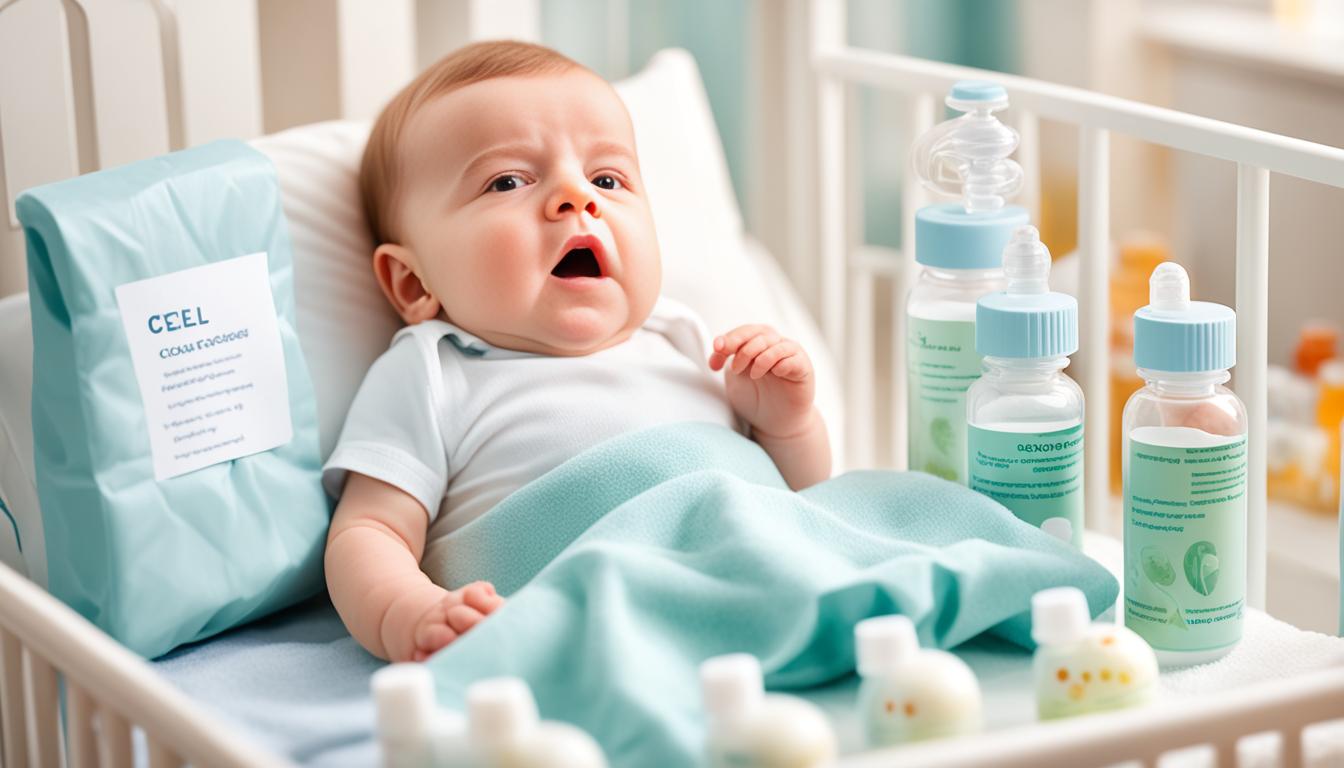Babies often catch the common cold easily. The virus responsible is called human rhinoviruses (HRV). Over 100 kinds of this virus have been found.
They mostly infect the upper airways. Yet, they can also affect the lower airways and worsen asthma. This illness is usually mild, but it can make parents miss work and school. This causes a big problem.
Right now, there isn’t a special medicine or vaccine for this cold. But knowing the signs, what causes it, and how doctors diagnose it can help. This information is important for parents to keep their babies healthy.
Key Takeaways:
- Human rhinoviruses (HRV) cause most colds in babies.
- The cold starts in the upper airways but can move to the lower ones and make asthma worse.
- There are no specific medicines or shots for baby colds.
- Doctors check for the common cold in babies by looking at the symptoms and examining them.
- Doing things like washing hands, staying away from sick people, eating well, and getting vaccines can help stop babies from getting colds.
Common Cold Symptoms in Babies
When babies get a common cold, they feel a range of symptoms. These can make them uncomfortable and irritable. It’s essential for parents to know these signs. This way, they can give the right care and keep their baby cozy.
The common symptoms of a cold in babies are:
- Runny or stuffy nose: This can make it hard for babies to breathe.
- Cough: They may cough a lot, with a dry or wet cough.
- Sneezing: Babies sneeze often to clear their noses.
- Fever: A slight rise in body temperature is typical. But, high or ongoing fevers should alarm parents to call a doctor.
- Sore throat: Their throat might be sore and scratchy, making them fussy.
- Sleep disturbances: A cold can mean interrupted sleep and fussiness.
- General fatigue: It can also make babies feel very tired.
Cold symptoms can be mild or severe. Some babies may show only a few signs. Others might have many symptoms at once. Newborns could have more serious signs needing urgent medical help. Watch for rapid breathing, feeding problems, or unusual sleepiness.
Parents can do a lot to ease their baby’s cold. Using saline drops, a humidifier, or a nasal aspirator can help a stuffy nose. Honey (for babies over 1 year old), sleeping with the head slightly up, and lots of liquids can calm coughs. Always talk to a doctor for the best advice on taking care of a sick infant.
When to Seek Medical Attention
Though most colds in babies are mild, some signs need quick doctor help. If a newborn shows any of these signs, parents should see a doctor right away:
- Rapid breathing or difficulty breathing
- Poor feeding or refusal to eat
- Lethargy
These symptoms might point to a more severe problem that needs a doctor’s check. It could be a strong respiratory infection or another health issue.
Causes and Diagnosis of Common Cold in Babies
The common cold in babies usually comes from different viruses. The main one is the human rhinovirus (HRV). Others like adenoviruses, influenza viruses, and coronaviruses can also lead to cold symptoms. These viruses spread easily through air droplets or touching things that infected people have touched.
Doctors diagnose a baby’s cold by looking at their symptoms and checking them over. They look at the baby’s body, like their temperature, throat, and nose, and listen to their breathing. If the baby has a runny or stuffed nose, cough, fever, and sneezes, it might be a cold.
Sometimes, a baby might need a test to know for sure. These tests can find the virus or if a bacterial infection is there. The test usually involves a gentle swab in the nose or throat to look for the virus causing the problem.
Common Cold Diagnosis in Babies – Clinical Symptoms
- Runny or stuffy nose
- Cough
- Sneezing
- Fever
If your baby shows these symptoms, talk to a doctor. They can help with early diagnosis and make your baby feel better faster. This can also help stop any serious issues.
Common Cold Causes in Babies
| Virus | Clinical Presentation | Transmission |
|---|---|---|
| Human Rhinoviruses (HRV) | Cold-like symptoms: runny/stuffy nose, cough, sneezing, fever | Respiratory droplets or direct contact |
| Adenoviruses | Cold-like symptoms, sore throat, conjunctivitis | Respiratory droplets, fecal-oral route, contact with contaminated surfaces |
| Influenza viruses | Cold-like symptoms, fever, body aches, fatigue | Respiratory droplets |
| Coronaviruses | Cold-like symptoms, fever, respiratory distress | Respiratory droplets, contact with infected individuals |
Parents should prevent common colds in babies. Teaching children good hygiene, like washing hands often and cleaning toys and surfaces, is key. Stay away from sick people and ensure your baby is healthy with good food and timely vaccines.
Stem Cell Therapy for Common Cold in Babies
Currently, there’s no stem cell treatment for the common cold in babies. Research in this area shows promise for many illnesses, including those in the respiratory system. But, using stem cells to fight the common cold isn’t proven yet.
Parents need to talk to their doctors about treating their baby’s cold. Pediatricians and doctors can suggest ways to help the baby feel better. Stem cell therapy for baby cold isn’t something they’d recommend right now.
It’s best to focus on stopping colds before they start. Teaching your baby to wash their hands often is a good start. Also, keep them away from sick people. Good food and vaccines are key to staying healthy and avoiding colds.
Even though stem cell therapy could be big in the future, proven methods are safer now. Talking to a doctor and keeping up with baby’s health checks are the best ways to keep them safe from the common cold.

